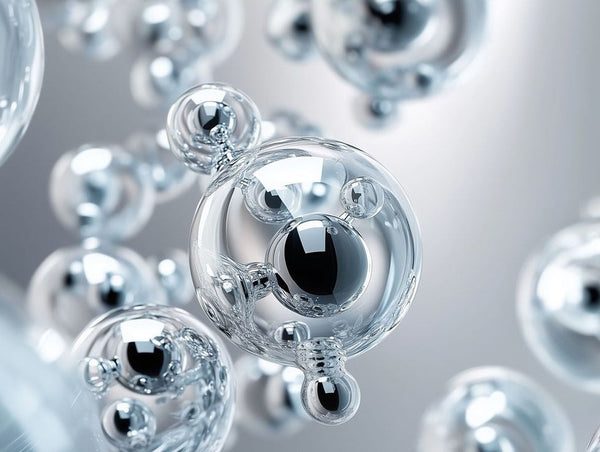Menopause is an inevitable phase in a woman's life that brings about various changes in her body. One significant impact of menopause is its effect on bone health. Understanding the connection between menopause and bone health is crucial to taking preventive measures and maintaining a healthy skeletal system.
Understanding Menopause and Its Impact on Bone Health
The Science Behind Menopause
Menopause is a natural biological process that occurs when a woman's reproductive function declines. Typically, it occurs between the ages of 45-55 and marks the end of a woman's menstrual cycle. During this time, the ovaries produce less estrogen and progesterone, leading to various changes in the body.
Menopause is characterized by symptoms such as hot flashes, night sweats, mood swings, and changes in sleep patterns. These symptoms are a result of hormonal fluctuations as the body adjusts to lower levels of estrogen and progesterone. While menopause is a normal part of aging, its symptoms can vary in severity from woman to woman.
Symptoms of Menopause
Physical Symptoms of Menopause
Menopause brings a range of physical symptoms that can affect a woman's daily life. These symptoms include:
- Hot flashes
- Night sweats
- Fatigue
- Weight gain
- Joint pain
Hot flashes, one of the most common symptoms of menopause, can cause sudden feelings of intense heat, flushing, and sweating. These episodes can be disruptive and uncomfortable, but there are strategies to help alleviate their frequency and intensity. Night sweats, which are hot flashes that occur during sleep, can lead to disrupted sleep patterns and fatigue.
Emotional and Mental Symptoms of Menopause
Aside from physical changes, menopause can also have an emotional and mental impact. Many women experience mood swings, irritability, anxiety, and depression during this time. Understanding and addressing these symptoms can significantly improve the quality of life during menopause.
Hormonal Connection with Osteoporosis
How Menopause Affects Hormonal Balance
Menopause disrupts the delicate hormonal balance in a woman's body. This hormonal imbalance can result in bone loss and weaken the skeletal system. During menopause, the ovaries produce less estrogen, leading to a significant hormonal shift. This decrease in estrogen levels can accelerate bone loss, making postmenopausal women more susceptible to osteoporosis. It is crucial for women approaching or experiencing menopause to be aware of these hormonal changes and work closely with healthcare providers to develop strategies to maintain bone health.
Role of Hormones in Bone Health
Hormones play a crucial role in maintaining bone health. Estrogen, in particular, helps in the absorption of calcium and other minerals essential for bone strength. When estrogen levels decrease, bone loss accelerates, increasing the risk of osteoporosis. Understanding the hormonal connection is vital in preventing this condition.
Estrogen
Estrogen plays a vital role in maintaining bone density by inhibiting bone resorption, the process by which bone tissue is broken down and released into the bloodstream. With the decrease in estrogen during menopause, this inhibition diminishes, leading to an imbalance between bone resorption and formation. Consequently, bone loss accelerates, increasing the risk of osteoporosis and fractures. The decrease in bone mass can make bones weak and vulnerable to fractures.
Additionally, menopausal women often experience changes in calcium metabolism and vitamin D levels, further exacerbating bone density loss.
Parathyroid & Calcitonin
Hormones such as parathyroid hormone and calcitonin also play significant roles in regulating calcium levels in the body. The parathyroid hormone helps to increase calcium levels in the blood when they are too low, while calcitonin works to decrease blood calcium levels when they are too high.
These intricate hormonal mechanisms work together to maintain the delicate balance of calcium in the bones and bloodstream, ultimately impacting bone health.
Symptoms of Osteoporosis
Osteoporosis is often known as "silent disease", since it does not show any severe symptoms, which distinguishes it from other muscular or bone disorders. However, some of the common symptoms include:
- Fragile bones that may break very easily
- Reduced bone density
- Severe back pain
- Stooped posture (kyphosis)
- Loss of height over time
How to Manage Menopausal Bone Loss
The onset of menopause underscores the importance of proactive measures such as calcium and vitamin D supplementation, weight-bearing exercises, and medication if necessary, to mitigate the adverse effects on bone health and reduce the risk of fractures.
Lifestyle Changes to Reduce Osteoporosis Risk
Dietary Changes for Bone Health
Adopting a bone-healthy diet is essential during menopause. Women should focus on consuming foods rich in calcium, vitamin D, and other nutrients that promote strong bones. Incorporating
- Leafy greens like kale, okra, spinach
- Dairy products, like milk, cheese, tofu
- Fortified products such as breads
- Nuts
- Fish
Magnesium helps in bone formation and helps reduce the risk of osteoporosis. Incorporate whole grains and seeds in your diet to further enhance bone health.
These foods not only provide essential nutrients but also help in maintaining bone density and strength.
Supplements with targeted bioactives like glucosamine, chondroitin, and MSM are ideal for bone strengthening. Magnesium supplements with high bioavailability and advanced formulas can help improve bone health.
Importance of Regular Health Check-ups
Regular health check-ups, including bone density tests, are crucial during menopause. These tests help in assessing bone health and identifying any signs of osteoporosis.
Consulting with a healthcare provider to create a personalized exercise plan can complement dietary changes and regular check-ups.
Exercises for Osteoporosis
Benefits of Exercise for Bone Health
Regular exercise boosts overall well-being, aids weight management, improves cardiovascular health, and enhances mood. Weight-bearing, resistance, and flexibility exercises strengthen bones. Combining nutrition, medical screenings, and exercise helps women reduce osteoporosis risk and maintain bone health during menopause.
Safe and Effective Exercises for Osteoporosis
It is essential to perform exercises that are safe and effective for individuals with osteoporosis. Low-impact activities like
- Swimming
- Yoga
- Tai chi
- Walking
- Dancing
- Weight-lifting
Engaging in such exercises is gentle on the joints while providing the necessary benefits for bone health. Exercise also promotes balance and flexibility, further reducing the chances of falling and sustaining injuries.
Also, resistance training using light weights or resistance bands can be beneficial for individuals with osteoporosis. Strengthening muscles can help support and protect the bones, reducing the risk of fractures. It is important to gradually progress in intensity and duration under the guidance of a professional to ensure safety and effectiveness in the exercise regimen.
Osteopenia
Aside from osteoporosis, menopausal women are also at a higher risk of developing osteopenia, a precursor to osteoporosis. Osteopenia is characterized by lower than normal bone density, but not low enough to be classified as osteoporosis. Regular bone density screenings can help detect these conditions early and allow for interventions to prevent further bone loss.
Osteopenia does not have any symptoms of its own, apart from bone density loss.
Conclusion
Menopause brings about significant changes in a woman's life, including its impact on bone health. Understanding the hormonal connection and taking proactive measures can help maintain strong and healthy bones during this transitional phase. By adopting lifestyle changes, such as a bone-healthy diet and regular exercise, women can reduce the risk of osteoporosis and enjoy a fulfilling and active life beyond menopause.



























 DOWNLOAD NOW
DOWNLOAD NOW
